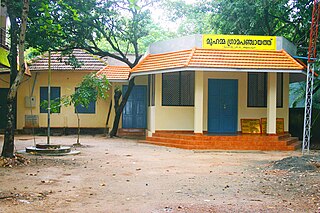Related Research Articles

Jammu and Kashmir was a region formerly administered by India as a state from 1952 to 2019, constituting the southern and southeastern portion of the larger Kashmir region, which has been the subject of a dispute between India, Pakistan and China since the mid-20th century. The underlying region of this state were parts of the former princely state of Jammu and Kashmir, whose western districts, now known as Azad Kashmir, and northern territories, now known as Gilgit-Baltistan, are administered by Pakistan. The Aksai Chin region in the east, bordering Tibet, has been under Chinese control since 1962.

Article 370 of the Indian constitution gave special status to Jammu and Kashmir, a region located in the northern part of the Indian subcontinent and part of the larger region of Kashmir which has been the subject of a dispute between India, Pakistan and China since 1947. Jammu and Kashmir was administered by India as a state from 17 November 1952 to 31 October 2019, and Article 370 conferred on it the power to have a separate constitution, a state flag, and autonomy of internal administration.

Poonch or Punch is a district of the Jammu division of Indian-administered Jammu and Kashmir in the disputed Kashmir region. With headquarters in the town of Poonch, it is bounded by the Line of Control on three sides. The 1947–48 war between India and Pakistan divided the earlier district into two parts. One went to Pakistan and the other became part of the then-Indian state of Jammu and Kashmir.
A sarpanch, gram pradhan, mukhiya, or president is a decision-maker, elected by the village-level constitutional body of local self-government called the gram sabha in India. The sarpanch, together with other elected panchayat members, constitute gram panchayats and zilla panchayats. The sarpanch is the focal point of contact between government officers and the village community and retains power for five years. the term used to refer to the sarpanch can vary across different states of India. Here are some of the commonly used terms for sarpanch in various states: panchayat president, gram pramukh, gram pradhan, gram adhyaksha, gaon panchayat president, gram panchayat president, etc.

Panchayati raj is the system of local self-government of villages in rural India as opposed to urban and suburban municipalities.

Kupwara district is an administrative district of Indian-administered Jammu and Kashmir in the disputed Kashmir region. It is one of the 10 districts located in the Kashmir Valley Division of Indian administered Kashmir. The Pohru River and Mawar river are two main rivers in the district. Both of them meet Jhelum river in Baramulla district.
Narinder Nath Vohra, popularly referred as N. N. Vohra, is a retired 1959 batch Indian Administrative Service (IAS) officer of Punjab cadre who was the 12th governor of the Indian state of Jammu and Kashmir. He was the first civilian governor of Jammu and Kashmir in eighteen years after Jagmohan.

Kulgam district is an administrative district of Indian-administered Jammu and Kashmir in the disputed Kashmir region. It is in the Kashmir division and is located at a distance of 18 kilometres (11 mi) towards south-west of Anantnag. The district comprises block, tehsil and town of Kulgam.
Local government in India is governmental jurisdiction below the level of the state. Local self-government means that residents in towns, villages and rural settlements are the people who elect local councils and their heads authorising them to solve the important issues. India is a federal republic with three spheres of government: union, state and local. The 73rd and 74th constitutional amendments give recognition and protection to local governments and in addition each state has its own local government legislation. Since 1992, local government in India takes place in two very distinct forms. Urban localities, covered in the 74th amendment to the Constitution, have Municipality but derive their powers from the individual state governments, while the powers of rural localities have been formalized under the panchayati raj system, under the 73rd amendment to the Constitution.

The Government of Jammu and Kashmir is the principal administrative authority responsible for the governance of the Indian union territory of Jammu and Kashmir. Established after the reorganization of the former state of Jammu and Kashmir in October 2019, the government operates under the framework of the Indian constitution. The union territory comprises two divisions—Jammu and Kashmir—with different cultural and geographical characteristics.

The Jammu and Kashmir Legislative Assembly, also known as the Jammu and Kashmir Vidhan Sabha, is the legislature of Indian union territory of Jammu and Kashmir.

Elections in the Union Territory of Jammu and Kashmir are conducted in accordance with the Constitution of India to elect the representatives of various bodies at national, state and district levels including the 114 seat unicameral Jammu and Kashmir Legislative Assembly and the Parliament of India. The first elections in the Union Territory of Jammu and Kashmir took place between 28 November and 19 December 2020 in the form of by-elections to District Development Councils and municipal and panchayat level bodies. A fresh delimitation process for assembly constituencies began in February–March 2020.

The Panchayat raj is a political system originating from the Indian subcontinent, primarily found in India and neighboring countries Pakistan, Bangladesh, Sri Lanka, and Nepal. It is one of the oldest systems of local government in the Indian subcontinent, with historical mentions dating back to around 250 CE. The word 'raj' means 'rule,' and panchayat' means 'assembly' (ayat) of 'five' (panch). Traditionally, panchayats consisted of wise and respected elders chosen and accepted by the local community. These assemblies resolved disputes between individuals and villages. However, there were various forms of such assemblies.

Shahid Iqbal Choudhary is a 2009 batch Indian Administrative Service officer from Jammu and Kashmir cadre and the current Secretary, Department of Rural Development and Local Self Government, Jammu & Kashmir. He secured an All India Rank 51 in the UPSC's Civil Services Examination for the year 2008. Shahid was the first Muslim from Jammu region and first Gurjar from J&K to get into Indian Administrative Service as a direct recruit from IAS.

Jammu and Kashmir is a region administered by India as a union territory and consists of the southern portion of the larger Kashmir region, which has been the subject of a dispute between India and Pakistan since 1947 and between India and China since 1959. The Line of Control separates Jammu and Kashmir from the Pakistani-administered territories of Azad Kashmir and Gilgit-Baltistan in the west and north. It lies to the north of the Indian states of Himachal Pradesh and Punjab and to the west of Ladakh which is administered by India as a union territory.

The Jammu and Kashmir Reorganisation Act, 2019 is an act of the parliament of India containing provisions to reconstitute the Indian-administered state of Jammu and Kashmir into two Indian-administered union territories (UTs) called Jammu and Kashmir, and Ladakh, and becoming effective on 31 October 2019. A bill for the act was introduced by the Minister of Home Affairs, Amit Shah, in the Rajya Sabha on 5 August 2019 and was passed on the same day. It was then passed by the Lok Sabha on 6 August 2019 and it received the president's assent on 9 August 2019.

On 5 August 2019, the government of India revoked the special status, or autonomy, granted under Article 370 of the Indian constitution to Jammu and Kashmir—a region administered by India as a state which consists of the larger part of Kashmir which has been the subject of dispute among India, Pakistan, and China since 1947.
A District Development Council is a form of elected local government in Jammu and Kashmir facilitated by the Jammu and Kashmir Panchayati Raj Act, 1989 and created under Jammu and Kashmir Panchayati Raj Rule, 1996 of the constitution of India. They are primarily aimed at electing the members from the rural and urban areas for the District Planning Committee and the councils themselves with fourteen members from each district for speedy development and economic upliftment.

Waheed ur Rehman Para is an Indian politician of Jammu and Kashmir People's Democratic Party and member of the Jammu and Kashmir Legislative Assembly (MLA) representing Pulwama constituency.. He is also the legislative party leader of the Jammu and Kashmir People's Democratic Party in J&K assembly.
References
- ↑ Iqbal, Naveed (2020-10-20). "District Development Councils (DDC): Why parties think this new layer of governance will kill politics in J&K". The Indian Express. Retrieved 2020-11-22.
- ↑ "Rules modified to enable quota for SC, ST and women in DDC in J-K". Outlook India. PTI. 24 October 2020. Retrieved 2020-11-22.